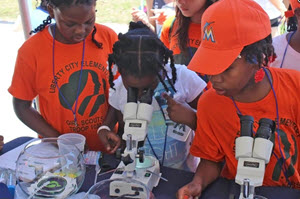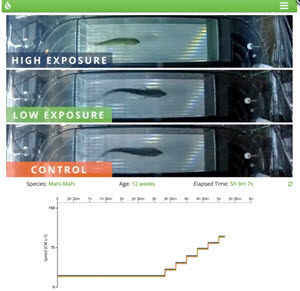
Miami Girl Scouts look at mahi-mahi embryos at an Ocean Kids outreach event. University of Miami students with the RECOVER consortium set up hands-on learning stations about the ocean. (Photo by RECOVER)
A child’s face lit up with wonder as she peered into a microscope for the first time and discovered a new world. Researchers at the Miami-based RECOVER consortium want experiences like this to happen more often for more students, so they designed and developed the RECOVER Virtual Lab. Now, scientists can engage students ages 8 and older anywhere anytime with an innovative lab experience that is accessible online and soon through the Apple App Store.
RECOVER Outreach lead Daniel DiNicola explained how the virtual lab came about, “In the consortium’s beginning, Martin Grosell [RECOVER Director] and I wanted to increase the public’s awareness and use of RECOVER’s visually-engaging experiments. We wanted something interactive that schools or public venues like museums could use.” The virtual lab is a consortium legacy product that will teach oil spill science for years to come and increases their classroom reach around the world.

Visitors to the Virtual Lab see an experiment showing how the swimming performance of Mahi mahi are affected by different levels of oil exposure. The chart below the fish tracks performance. (Photo provided by RECOVER)
The lab’s development began in earnest using the same team that built the RECOVER website. “We liked that they already understood the research and that they work close by at the University of Miami’s main campus,” explained DiNicola. Development took about eight months and included storyboarding, wire framing, script development, filming, post production, data visualization, app design, and coding.
Internal beta testing for the virtual lab gave the RECOVER team feedback that improved science accuracy. “It was extremely beneficial to work alongside the scientists whose work is featured in the app,” said DiNicola. “The scientists offered insight and guidance that helped us refine the product and identify bugs.”
The pilot lesson, Fish Treadmills, is geared toward middle school, high school, and college students. Future lessons will include an experiment on visual acuity, fish embryonic and larval development, and social interactions. “All our lessons will feature one RECOVER graduate student acting as the virtual lab partner and explaining their research,” explained DiNicola. “We believe this is a great way for our students to practice valuable science communication skills as well as show their enthusiasm for their work.”
An evaluation component is built into the app to help determine and quantify the virtual lab’s success. Grade-specific quizzes available after every lesson will give the RECOVER team valuable insights into the lesson’s effectiveness. The demographic and location data collected by the quizzes will help identify use and participation trends. The RECOVER team hopes to publish their findings on the tool’s effectiveness using the evaluation data.
Grade-specific workbooks and transcripts for educators and students are available for download. Future plans for the virtual lab include more lessons for younger elementary students. For more information, visit the RECOVER website.
************
This research was made possible in part by a grant from the Gulf of Mexico Research Initiative (GoMRI) to the Relationship of Effects of Cardiac Outcomes in Fish for Validation of Ecological Risk (RECOVER) consortium.
The Gulf of Mexico Research Initiative (GoMRI) is a 10-year independent research program established to study the effect, and the potential associated impact, of hydrocarbon releases on the environment and public health, as well as to develop improved spill mitigation, oil detection, characterization and remediation technologies. An independent and academic 20-member Research Board makes the funding and research direction decisions to ensure the intellectual quality, effectiveness and academic independence of the GoMRI research. All research data, findings and publications will be made publicly available. The program was established through a $500 million financial commitment from BP. For more information, visit http://gulfresearchinitiative.org/.
© Copyright 2010- 2017 Gulf of Mexico Research Initiative (GoMRI) – All Rights Reserved. Redistribution is encouraged with acknowledgement to the Gulf of Mexico Research Initiative (GoMRI). Please credit images and/or videos as done in each article. Questions? Contact web-content editor Nilde “Maggie” Dannreuther, Northern Gulf Institute, Mississippi State University (maggied@ngi.msstate.edu).
